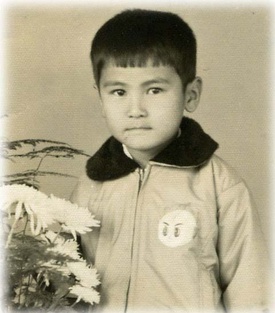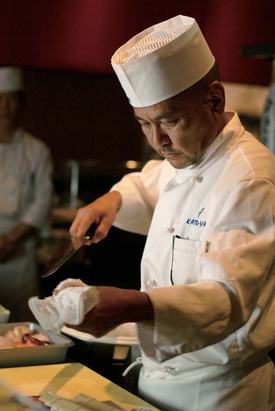Katsuya Uechi is a Japanese chef and entrepreneur who currently operates 25 restaurants across the U.S., including those he co-manages with partner companies. His name has now become well-known throughout the U.S. through his Katsuya brand of restaurants, not to mention to industry insiders.
In October 2018, he was selected as the headline chef for the Las Vegas Food and Wine Festival, which brings together famous chefs. Katsuya produced a tuna cutting show at the festival. He appeared on stage as the sound of Japanese drums reverberated and the audience's anticipation grew, cutting up a gigantic 260-pound tuna, cutting it into sashimi and sushi, and serving it to the people who were waiting in a long line.
Inspired by Rocky Aoki's autobiography
Katsuya was born in Miyakojima, Okinawa in 1959. His parents ran a restaurant in Naha City. As a young boy, Katsuya had always wanted to be a police officer, but "I was so bad in high school that I couldn't graduate. I gave up on my dream of being a police officer and went to Tokyo. I then graduated from Tsuji Culinary Institute in Osaka." He returned to Okinawa and worked at a Japanese restaurant in a hotel, but a turning point came when he returned. "A customer sitting at the sushi counter was talking with a friend. He talked about America and found out that I ran a restaurant. When the customer was leaving, he asked me to use his restaurant in America." At the time, Katsuya had just read the autobiography of Rocky Aoki, the founder of Benihana, who had expanded his teppanyaki restaurant chain in America with great force. He was probably torn between anxiety about the future and a sense of adventure, wondering whether he would spend the rest of his life in Okinawa or whether he could live a life like Rocky's. "When I told my parents I wanted to come to America, they said, 'Go, go!' I think they meant it as 'Go and gain some good experience.'"
He then moved to the US in 1984. The restaurant he worked at closed after a year, and he moved to another restaurant where he worked for a long time. Before long, many customers were lining up in front of the counter to have Katsuya make sushi for them. "There was a two-hour wait just for me. That's why we have to be perfectly prepared when welcoming customers. It's important to welcome them sincerely. And we sell ourselves on things we're confident in. We say, 'Try it even if you think you're being tricked. If you don't like it, you don't have to pay.' 100 out of 100 people will eat it. And 99.9% will say it's delicious. The remaining 0.1% are eccentric people (laughs). That's how he leaves an impression on customers. They know they can't go wrong if they sit with him. And I also remember the faces, names, and preferences of the customers. The attitude of a sushi chef is the same in Japan and the US."
The turning point was a partnership with a US company
In 1997, Katsuya finally became independent, buying the store from his boss and becoming the owner. "Am I thrilled to be independent? Not at all. I was more worried than anything. I only had $800 in cash. I had two children and a wife. I had to support my family and run the store with the money I had. I continued to worry. But within a year, one Friday customers started pouring into the store. Up until then, people from the film industry had been coming here and there. Perhaps due to word of mouth, the number of customers suddenly increased one Friday. The flow of customers hasn't stopped since."
After that, he steadily increased the number of his own stores in the Los Angeles area. However, what made his name widely known was when he teamed up with an American company in 2005 and began to develop stores through partnerships. "I met them in 2004. They proposed to create my own brand. Did I think it was a chance? I didn't. I kept refusing. I didn't want to be in a partnership. But they didn't give up. They asked me to come to their office once. So I went and felt their energy. I felt like I wanted to give it a try. I thought it was interesting, but when you actually team up as a partner, a power game begins, with one side being stronger and the other being stronger, right? But I felt the energy at the office and decided to join forces. The key to success is not to leave it up to the other party, but to make an effort to produce results yourself. But in my case, it's the other party's efforts that are the biggest. First of all, they have a lot of capital. I entrusted the design of the store to a famous designer called Philippe Starck. All of those things must have matched up well."
Courtesy, respect, filial piety
Katsuya's attitude and way of speaking are very humble, perhaps because it took him a long time to become independent and he had to partner with an American company and learn different cultures and methods. Now, he is also putting his efforts into nurturing the next generation and doing charity work. He said that he felt it was very meaningful that the proceeds from the festival introduced at the beginning of this article were donated to children's cancer treatment. We asked Katsuya about his identity again.
"I'm Japanese. I can't become an American. The other day I watched a TV program introducing Japanese people living abroad. An elderly woman in her 90s who lives in Brazil appeared on the show and repeatedly said 'act like a Japanese person' over the course of 30 or 40 minutes, which made a big impression on me. Recently, the words of that woman have stuck with me the most. Being like a Japanese person means valuing courtesy, respecting elders, and being filial to your parents. I was impressed by what the Brazilian grandmother said about 'acting like a Japanese person'."
Currently, the company has a total of 450 employees. He came to the US 35 years ago after hearing a conversation between Japanese people living in the US at a sushi counter in Naha, and now, including the families of his employees, Katsuya is responsible for the lives of over 1,000 people. "What advice would you give to young Japanese people who want to come to the US? First of all, you have to have a goal. If you have that goal, don't give up until the end. Even if you get to 99% of the way, if you give up at the last 1%, it's no good. I didn't want to quit. I didn't give up, or rather, I couldn't give up. Also, I couldn't keep the young people working for us as managers forever. I wanted them to grow more, so I left the stores to them, and the number of stores increased steadily. I have dreams, and I've supported the people working for us to make their dreams come true." Katsuya smiled gently as he said this. The road is still continuing into the future.
© 2018 Keiko Fukuda







